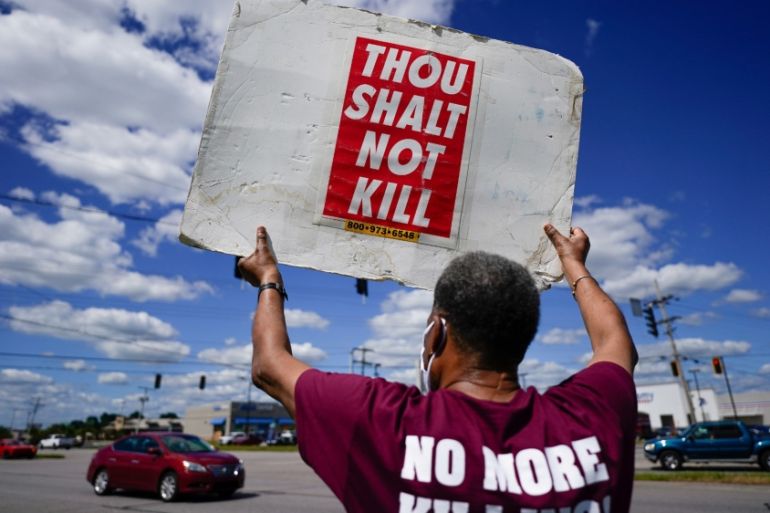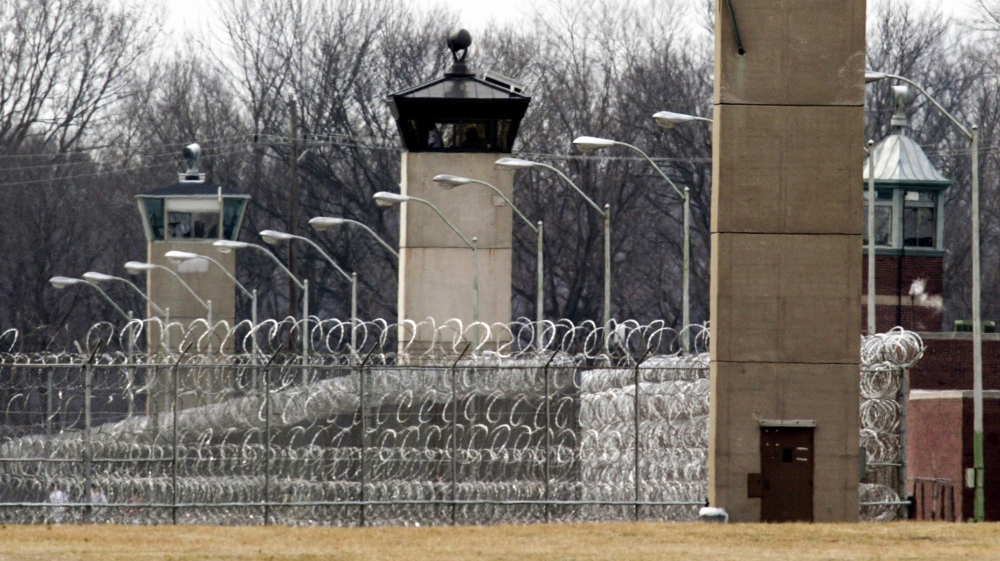US court blocks execution amid claims of mental incompetence
The order blocks two further planned executions which the Trump administration heralds as a return to law and order.

A United States District Court in Washington, DC has blocked what would have been the second federal execution in 17 years, hours before it was due to take place.
The US Department of Justice had planned to execute Wesley Purkey, who has been convicted of raping and murdering a 16-year-old girl, despite objections by Purkey’s lawyers that he has dementia and no longer understands his punishment.
Keep reading
list of 4 itemsRecord number of people executed for drug offences in 2023
Executions in Iran hit 8-year high in 2023
Australian writer Yang Hengjun sentenced to death on China spy charges
Wednesday’s order by District Court Judge Tanya Chutkan to block Purkey’s execution also prevents the federal government from executing two others – Dustin Honken and Keith Nelson – convicted of murdering children.
“The court finds that at least one of plaintiffs’ claims has a likelihood of success on the merits, and that absent a preliminary injunction, plaintiffs will suffer irreparable harm,” Chutkan said.
Purkey, 68, was convicted in 2003 in Missouri. He dumped his victim’s dismembered and burned remains in a septic pond.
The Justice Department immediately appealed in both cases. A separate temporary stay was already in place from the 7th US Circuit Court of Appeals.
The early morning legal wrangling suggests a volley of litigation will continue in the hours ahead of Purkey’s scheduled execution, similar to what happened when the government executed Daniel Lee, following a ruling from the Supreme Court.

The US government carried out its first execution in 17 years on Tuesday, putting to death convicted murderer Lee after the Supreme Court cleared the way with an overnight ruling.
Purkey, of Lansing, Kansas, would be the second, but his lawyers were still expected to press for a ruling from the Supreme Court on his competency.
“This competency issue is a very strong issue on paper,” Robert Dunham, executive director of the Death Penalty Information Center, told The Associated Press news agency. “The Supreme Court has halted executions on this issue in the past. At a minimum, the question of whether Purkey dies is going to go down to the last minute.”
Read the statement of our executive director, @RDunhamDPIC concerning the Department of Justice's efforts to restart federal executions. https://t.co/AX0I2AaY6U #deathpenalty pic.twitter.com/t90042yrKZ
— DeathPenaltyInfoCtr (@DPInfoCtr) July 13, 2020
While various legal issues in Purkey’s case have been hashed, rehashed and settled by courts over nearly 20 years, the issue of mental fitness for execution can only be addressed once a date is set, according to Dunham, who teaches law school courses on capital punishment. A date was set only last year.
“Competency is something that is always in flux,” so judges can only assess it in the weeks or days before a firm execution date, he said.
In a landmark 1986 decision, the Supreme Court ruled the constitution prohibits executing someone who lacks a reasonable understanding of why he or she is being executed.
It involved the case of Alvin Ford, who was convicted of murder but whose mental health deteriorated behind bars to the point, according to his lawyer, he believed he was the pope.
“I could say I was Napoleon,” Dunham said. “But if I say I understand that Napoleon was sentenced to death for a crime and is being executed for it – that could allow the execution to go ahead.”
Purkey’s mental issues go beyond Alzheimer’s, his lawyers said. According to them, he was subject to sexual and mental abuse as a child and, at 14, was diagnosed with schizophrenia, bipolar disorder, major depression and psychosis.
Last week, three mental health organisations urged US Attorney General William Barr to stop Purkey’s execution and commute his sentence to life in prison without the possibility of parole.
The National Alliance on Mental Illness, Mental Health America and the Treatment Advocacy Center said executing mentally ailing people like Purkey “constitutes cruel and unusual punishment and does not comport with ‘evolving standards of decency'”.
We remain unequivocal in our belief that the death penalty is cruel and unusual punishment. This form of punishment is infected with racial discrimination and has resulted in 160 innocent people being convicted and sentenced to death since 1973. https://t.co/EwXtn4KusS
— Legal Defense Fund (@NAACP_LDF) June 29, 2020
The mother of the slain teenager, Glenda Lamont, told the Kansas City Star last year she planned to attend Purkey’s execution.
“I don’t want to say that I’m happy,” Lamont said. “At the same time, he is a crazy mad man that doesn’t deserve, in my opinion, to be breathing any more.”
The run-up to Lee’s execution demonstrated that a lot can still happen before Purkey’s scheduled one.
On Monday, hours before Lee was set to be put to death, a US District Court judge put the execution on hold over concerns from death row inmates on how executions were to be carried out, and an appeals court upheld it.
The Supreme Court overturned it early on Tuesday, with the five conservative justices joining and the four liberals dissenting.
The justices dismissed Lee’s claim that his execution was cruel and unusual, an appeal to the Eighth Amendment of the US Constitution, which prohibits such punishments.
The justice department had scheduled Honken’s execution on Friday. Nelson had been set to be executed on August 28.
Orders from lower courts to block executions often end up before the Supreme Court. The high court rarely permanently blocks executions, though it has happened in recent years.